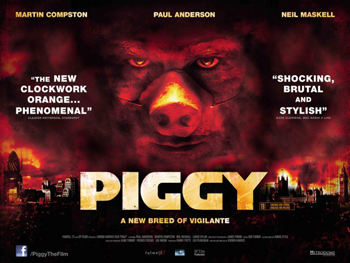Piggy **
 London seems to be awash with potentially violent males lurking on every street corner, ready to explode with pent up rage given the right situation – if homegrown cinema is anything to go by. Debut writer-director Kieron Hawkes’ Piggy is another depressingly gritty tale of modern-day woe from the UK capital’s ‘mean’ streets that follows a vengeful angle to justify its brutal onslaught. Even the most hardened viewer will find this genuinely beautifully shot film tough to stomach, with little respite or acceptable explanation as to how its protagonist goes from loathing violence to cold-hearted and mindless thuggery.
London seems to be awash with potentially violent males lurking on every street corner, ready to explode with pent up rage given the right situation – if homegrown cinema is anything to go by. Debut writer-director Kieron Hawkes’ Piggy is another depressingly gritty tale of modern-day woe from the UK capital’s ‘mean’ streets that follows a vengeful angle to justify its brutal onslaught. Even the most hardened viewer will find this genuinely beautifully shot film tough to stomach, with little respite or acceptable explanation as to how its protagonist goes from loathing violence to cold-hearted and mindless thuggery.
Mild-mannered and solitary Joe (Martin Compston) is coasting through life in a mundane job and shut away from society until his older brother, John (Neil Maskell), comes back into his life and offers him a chance to reconnect, socially. But after being mugged, then witnessing trouble brewing at the local pub between John and a bunch of men, Joe decides to go home early that night only to be woken by John’s friend, Claire (Louise Dylan), and told that John has been brutally attacked and is on his death bed in hospital. Losing his brother and only real friend, Joe gets a knock one day from a mysterious stranger who claims to have been old school friends with John. Piggy (Paul Anderson) wants to help Joe get revenge for John’s death by ‘hunting’ down those responsible, outside of the law. But the price of revenge is a steep one that Joe realises all too late.
The context of revenge is a very tricky subject to depict in any film for danger of glorifying the violence and demeaning the complex reasons behind what drives it. In Hawkes’ case, the mindless death of a loved one is an excuse anyone can immediately relate to. What the script development fails to deliver is any real sense of how events play such huge psychological damage on Joe that he is driven to continue down the same path, long after retribution has been served. There is too big a piece of the puzzle missing from the character’s arc to be satisfying, although there is a nice twist to the expected ending.
Indeed, Hawkes favours The Horseman (2008) style of implied brutality, letting the imagination run riot and using a whole number of bone-crunching, gut-squelching effects to suggest the horrific bodily damage being inflicted on the hostages. All the while we are party to Anderson as Piggy’s disturbing if over-acted presence as he toys with his prey wearing a pig snout. In this sense, there are no added surprises as we expect each member of the pub gang to meet their fate.
That said ‘judge and executioner’ Piggy dishes out the punishment then intriguingly observes Joe’s reaction in return: It’s here that Hawkes’ film sadly reverts to visceral ‘gangster’ type as it misses the opportunity to explore the full psychological impact in more depth of what is effectively a look at capital punishment gone wrong, all coming too late to suitably round off the story. The result is a lot of the physical and very little mental energy spent. It’s an added shame because Anderson becomes more ‘bogeyman’ caricature than he should be opposite Compston’s reserved persona.
Piggy is a bold and striking start for Hawkes who shows off his impressive technical skills. However, the general topic is too titillating in execution to fully influence any worthy debate into the effects of isolating grief, leaving an altogether lacking investigation and no strong feelings either way for either character we are exposed to.
2/5 stars
By @FilmGazer